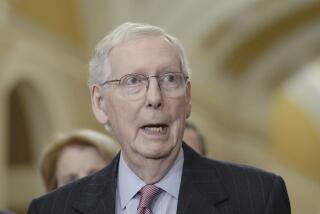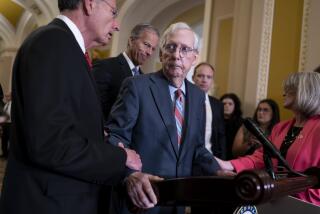A Conference Call of Historic Proportions
- Share via
WASHINGTON — How do you get a passel of U.S. senators, scattered far and wide, on the phone at once?
Politically, the only correct answer is that you corral such major players very, very deferentially. Logistically, you call AT&T.;
For the first time in Senate history, 48 Republican members got on a conference call Monday and elected a new leader, Sen. Bill Frist of Tennessee. The Senate Historian’s Office said such a call has never happened before. But “our office is not privy to every call they make,” Assistant Senate Historian Betty J. Koed added diplomatically.
Aware that most of the lawmakers had gone home for the holidays but still were eager to put the trauma that toppled Sen. Trent Lott (R-Miss.) behind them, the Republican leadership decided Friday to have the vote by phone. Two key logistical problems arose -- the line had to be secure, and the vote had to be recorded.
AT&T; had the line. GOP staffers provided contact numbers for the senators. It was decided that the phone company would tape the conversation and then send the transcript to the Senate, where it could be recorded, staffers at the Republican Conference said. Also on the line, to witness the discussion, were staffers from the Senate GOP leadership offices.
Like teleworkers everywhere (as they’re called in the industry), senators dialed a number, gave a pass code and were admitted to the call. If anyone knows which senators got on the line first and had to wait for the others, they’re not talking. Among the lawmakers who missed the call was Sen. John McCain (R-Ariz.), who was traveling in Asia.
Normally, Senate conference calls are placed by the Capitol switchboard -- which handled four or five such phone calls Monday. Staffers there reported that they soon may offer Web-based teleconferencing as well.
But the need for secrecy and privacy -- and the unusually large number of participants -- meant the Senate opted for the low-tech telephone conference, eschewing more dynamic videoconferencing.
“They could have been more adventurous, but the old-fashioned phone works quite well,” said Tim Kane, chief executive and founder of Kinetic Workplace, which he said helps Fortune 500 companies “develop, implement and maintain their telework and virtual officing.”
Kane said that as of last year, 28 million Americans were “teleworking,” and that the numbers have increased since the terror attacks of Sept. 11. He called it “very encouraging to see our politicians take advantage of the tremendous opportunities” provided by the new technology.
During Monday’s call, Sen. John W. Warner of Virginia nominated Frist, and incoming Sen. Norman Coleman of Minnesota seconded the nomination. Sen. Rick Santorum of Pennsylvania called for the “yeas,” of which there were many. He called for the “nays,” of which there none. With Frist anointed, there followed a long spell of talk about what issues to push in the new Congress. Finally, after 45 minutes, the call ended.
Frist is no stranger to the world of teleconferences. He uses them to brief radio reporters in Tennessee on his activities, and he conducted a videoconference with Roger Crouch, an astronaut from Tennessee, while Crouch was aboard the space shuttle Columbia in 1997.
But whether the Senate -- an institution that still records votes in person by the laborious, if sonorous, roll call -- would again take a vote by phone remains to be seen.
“It was because of Christmas,” said one Senate staffer. “Normally, we have a meeting.”
*
Times staff writer Nick Anderson contributed to this report.
More to Read
Get the L.A. Times Politics newsletter
Deeply reported insights into legislation, politics and policy from Sacramento, Washington and beyond. In your inbox twice per week.
You may occasionally receive promotional content from the Los Angeles Times.










